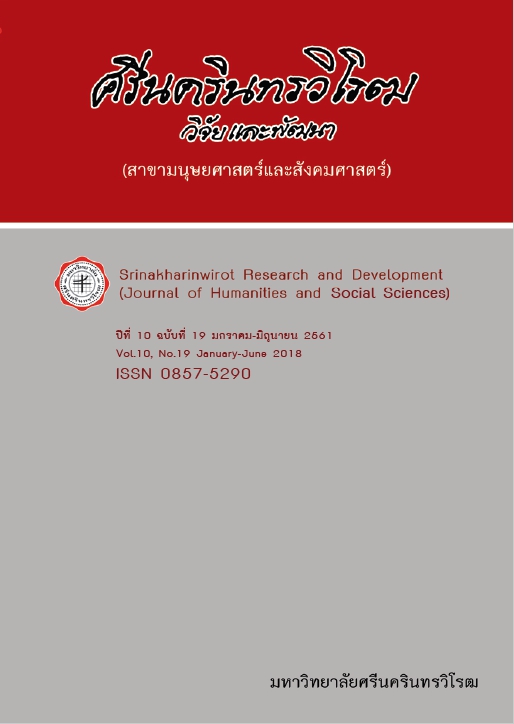ปัจจัยการธำรงรักษาที่มีผลต่อการคงอยู่ของคนเก่งใน บจก. วิทยุการบินแห่งประเทศไทย (RETENTION FACTORS INFLUENCING INTENTION OF TALENTS TO STAY IN AEROTHAI)
Keywords:
Talent Retention, Intention to Stay, Talent ManagementAbstract
The objectives of this mixed method research were 1) to compare the level of organizational commitment of talents who have different personal factors 2) to compare the executive’s and employee’s opinions towards intention to stay 3) to compare talents’ opinions towards retention factors; and 4) to study influence of retention factors on retaining talented people in AEROTHAI. The questionnaires and in-depth interview questions were used for data collection from the samplesthat consisted of executives and employees who were the top three ranking in performance appraisal for the last three years. There were 136 respondents who filled in questionnaires, and 14 in-depth interview respondents. Statistical techniques used for data analysis are Frequency, Mean, Percentage, Standard Deviation, One-way ANOVA, Least-Significant Different, t-test, and Multiple Regression. The quantitative research findings showed that the overall of intention to stay of talented people fell in high level ( = 3.98) and the affective commitment had the highest average ( = 4.09). Based on comparison of talents who had different personal factors, there was no significant different opinion towards intention to stay holistically. Each aspect was found that men had higher levels of affective commitment than women. The talents with older ages, higher salaries and positions had higher levels of affective commitment. In addition, the executives’ opinions towards affective commitment were higher than the employees’ while the executives’ opinions towards the continuance commitment were less than the employees’. The comparison of Talent’s opinions towards retention factors was found that reward and remuneration factor had the highest average ( = 3.89), which was considered as high level. With respect to a statistically significant influence of retention factors, the result also revealed that the reward and remuneration had influence on holistic intention of talents to stay in AEROTHAI. Furthermore, the work environment factor had influence on the continuance commitment and organizational culture factor had influence on the normative commitment. It was consistent with the qualitative research findings, which found retention factors influencing intention of talents to stay in five aspects: 1) work-life balance 2) challenging work, success and recognition 3) fair and reasonable remuneration 4) relationships between supervisors and employees 5) learning and development in line with their roles and responsibilities.
Downloads
References
[2] กฤติน กุลเพ็ง. (2552). ไม่อยากเสียคนเก่งในองค์กรต้องทำอย่างไร. กรุงเทพฯ: เอช อาร์ เซ็นเตอร์.
[3] วิชัย วงษ์ใหญ่. (2558). การบริหารคนเก่ง (Talent Management). สืบค้นเมื่อ 15 ธันวาคม 2558, จากhttps://curriculumandlearning.com
[4] Michaels, E.; Jones, H. And Axelrod, B. (2001). The War for Talent. Massachusetts: Harvard Business School Publishing.
[5] บริษัท วิทยุการบินแห่งประเทศไทย จำกัด. (2558). แผนวิสาหกิจ พ.ศ. 2558-2562.
[6] บริษัท วิทยุการบินแห่งประเทศไทย จำกัด และสถาบันเพิ่มผลผลิตแห่งชาติ. (2558). รายงานฉบับสมบูรณ์
ผลการสำรวจความผูกพันต่อองค์กรของพนักงาน บริษัท วิทยุการบินแห่งประเทศไทย จำกัด ประจำปี พ.ศ. 2558.
[7] กรมเจรจาการค้า. (2555, 16 มีนาคม). มาตรฐานร่วมสำหรับวิชาชีพที่ทำงานได้ในประเทศ AEC (MRA). สืบค้นเมื่อ 14 ธันวาคม 2558, จาก https://thai-aec.com
[8] Michaels, E.; Jones, H. and Axelrod, B. (2001). The War for Talent. Massachusetts: Harvard Business School Publishing.
[9] Eric, A. (2003). Retaining the Best of the Best. AFP Exchange. 23(6): 48.
[10] Lisbeth Claus. (2007). Employee Retention, Best Practices in Keeping and Motivating Employees. Willamette University.
[11] บุญใจ ศรีสถิตนรากูร. (2551). ภาวะผู้นำและกลยุทธ์การจัดการองค์กรพยาบาลในศตวรรษที่ 21. พิมพ์ครั้งที่ 2. กรุงเทพฯ: โรงพิมพ์แห่งจุฬาลงกรณ์มหาวิทยาลัย.
[12] Allen, N. J. & Meyer, J. P. (1993). Organizational Commitment: Evidence of Career Stage Effect. Journal of Business Research. 26: 49-61.
[13] ณัฐพล ขันธไชย. (2557, มกราคม-มิถุนายน). บทวิจารณ์บทความ. วารสารเกษมบัณทิต. 15(1): 140-144.
(อ้างอิงจาก Green. Samuel. B. (1991). “How Many Subjects Does it Take to Do a Regression
Analysis?”. Multivariable Behavioral Research. 26(3): 499-510.)
[14] ปุระชัย เปี่ยมสมบูรณ์. (2544). การวิจัยประเมินผล : หลักการและกระบวนการ. พิมพ์ครั้งที่ 8. กรุงเทพฯ: สำนักพิมพ์เสมาธรรม.
[15] สุชาติ ประสิทธิ์รัฐสินธุ์. (2556). การใช้สถิติในงานวิจัยอย่างถูกต้องและได้มาตรฐานสากล. พิมพ์ครั้งที่ 6. กรุงเทพฯ: สามลดา.
[16] Kline, R.B. (2005). Principles and Practice of Structural Equation Modeling. 2nd ed. New York: Guilford.
[17] ปฐมพงศ์ โตพานิชสุรีย์. (2553). การรักษาผู้มีผลสัมฤทธิ์สูงในองค์การ: กรณีศึกษาข้าราชการพลเรือนสามัญ. วิทยานิพนธ์บริหารธุรกิจมหาบัณฑิต (เน้นการบริหารทรัพยากรมนุษย์และองค์การ) คณะพาณิชยศาสตร์และการบัญชี มหาวิทยาลัยธรรมศาสตร์.
[18] พรทิพย์ เตชะอาภรณ์ชัย. (2543). ปัจจัยที่มีความสัมพันธ์ต่อความผูกพันต่อองค์การ: ศึกษากรณีพนักงานธนาคารแห่งประเทศไทย. วิทยานิพนธ์ปริญญาวิทยาศาสตรมหาบัณฑิต มหาวิทยาลัยเกษตรศาสตร์.
[19] Steers, R.M. (1977). Antecedents and Outcomes of Organizational Commitment. Administrative Science Quarterly. 22:46-56.
[20] วันเพ็ญ เพ็ชรัตน์; พรรัตน์ แสดงหาญ; และ อธิพล เครือปอง. (2556). การธำรงรักษาและการคงอยู่ของคนเก่งในนิคมอุตสาหกรรมแห่งหนึ่ง จังหวัดชลบุรี. วารสารการจัดการ. 2(2): 59-70.
[21] Herzberg, F. and Others. (1959). The Motivation to work. New York: John Wiley & Sons.
[22] Adams, J. Stacey. (1965). Inequity in social exchange. ED, Advances in Experimental Social Psychology. Academic Press. New York. 2: 267-299.
Downloads
Published
How to Cite
Issue
Section
License
Srinakharinwirot Research and Development Journal of Humanities and Social Sciences is licensed Under a Creative Commons Attribution-NonCommercial-NoDerivs 4.0 International (CC-BY-NC-ND 4.0) License, Unless Otherwise Stated. Please Read Journal Policies Page for More Information on Open Access, Copyright and Permissions.



